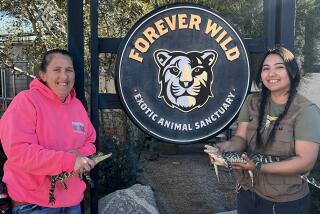Reptile Starting to Crop Up on Menus : Alligator: An Acquired Taste Livin’ in Cajun Country
- Share via
BRIDGE CITY, La. — Outside, the sound of skeet shot sizzles through the air like a chicken leg new to a deep-fat fryer. Inside, a hot skillet hisses on a makeshift trivet--a copy of “Shotgun News.” Spicy Chinese alligator is being served.
Welcome to the South Louisiana Gun Club, domain of Alligator Art, Mr. Alligator, a.k.a. Art Cormier, clubhouse director and alligator nuisance control officer of Jefferson Parish.
Cormier’s job is to capture alligators that wander from the bayous into areas where they don’t belong in this shipyard town on the Mississippi. Responding to calls placed by police, Cormier has apprehended ‘gators at intersections, golf courses, swimming pools, a grease rack at a gas station and even a drain at a car wash.
Last year Cormier caught 90 of them, returning 60 to the swamps. He makes no salary, only the money he earns from selling the skins of those he doesn’t return. Last year, he was paid $30 per foot.
‘I Respect Them’
But his real love is to cook alligators, eat them and talk about them.
“I respect them,” said Cormier, a jolly man with a waxed handlebar mustache and an ample belly wedged between two red suspenders.
There is evidence everywhere of his ‘gator fixation. He dons an alligator apron, sets the table with alligator-shaped salt-and-pepper shakers and sports a “family” photo album of alligator snapshots. A large, mounted and shellacked alligator head sits nearby on a clubhouse table.
Cormier, known throughout the parish for his alligator recipes, sometimes prepares banquets for local politicians or the police. He catered his daughter’s wedding, preparing, among other dishes, sauce piquante, a stewy concoction made with alligator chunks marinated in vermouth.
“I hope this is a good year (for alligators),” Cormier joked. “I got another one getting married.”
Exotic Supper for the Homeless
What’s more, several times a year, he cooks alligator for the homeless in New Orleans. “We break out the ‘gator kitchen for ‘em,” says Cormier. “They’re so tickled pink.”
The alligator’s red body meat is generally used for long-cooking preparations such as soups and gravies, says Cormier, because it is stringy and tough. The white tail meat is preferable for quick preparations, such as stir-fries, but it is important not to overcook it, since the meat can easily become rubbery.
Larger alligators are tougher than smaller ones, but they both taste like chewy chicken with a hint of fishiness.
Alligator is starting to crop up on restaurant menus, particularly in Louisiana and Florida, since the Department of the Interior reclassified the reptile in 1987.
Once endangered, it has now been given the status of “threatened due to similarity of appearance.” That means states must register and tag all American alligator hides simply to protect other endangered species that look like it (such as the African crocodile).
Counting ‘Gators by Night
Although alligators can now be hunted, states determine the season and how many can be trapped. In Louisiana, the 30-day season is September. State wildlife specialists survey alligator populations at night, when the reptiles’ eyes glow “like red coal,” said Lt. Keith LaCaze, public information officer in the enforcement division of the Louisiana Department of Wildlife and Fisheries.
Flashlights are used to find nests. Then, using eye and nest counts, the wildlife specialists determine the percentage of ‘gators that can be trapped from private and state-owned lands.
Cormier’s job permits him to hunt alligator year-round. Like sportsmen, however, he must return to the swamps all alligators that are shorter than 4 feet.
When Cormier is not arresting alligators or giving talks at local schools about them, he runs the gun club, raises cattle, fishes and traps. “A regular Cajun livin’,” he calls it.
Cormier often smokes his catch, whether it be raccoons, ducks, turkeys or nutrias, animals similar to muskrats. “I smoke everything but cigarettes,” he says.
Another Kind of Crazy for Crawfish
He also has a hearty appetite for freshly boiled crawfish, sometimes dropping by to chat with Papa Joe Hymel and his son, Brian, who own Hymel’s Food Store, a small country grocery that smokes its own sausage and boils crawfish in huge pots behind the store. (After a back-yard binge of freshly boiled crawfish, Cormier professed that he once won a crawfish-eating contest: 56 pounds in 45 minutes. “When I get next to a stack, you can’t stop me.”)
But for everyday eating, “Mama does the daily staples, the red beans and rice,” Cormier said, referring to his wife, Pat.
Pat Cormier takes it all with a sense of humor, given that her husband’s work-hobby schedule has cut into the family life just a bit. Art Cormier was out duck hunting when his second daughter was born, for example, and once in the middle of the night Pat Cormier stepped on an alligator that Art had captured and temporarily put in the family bathtub. It had decided to take a little walk.
She has had to contend with the sound of chirping crickets that Art feeds to the four small alligators in a living room aquarium. And she also has to help tend to the family’s three dogs, one rabbit, an otter and a cockateel that whistles the marching theme from “The Bridge on the River Kwai.”
That’s not to mention the Cormiers’ three children, 23, 22 and 21. Referring to their rapid succession, Art Cormier takes full responsibility. “I found out it was the way I was cookin’ alligator,” he said.
More to Read
Eat your way across L.A.
Get our weekly Tasting Notes newsletter for reviews, news and more.
You may occasionally receive promotional content from the Los Angeles Times.










